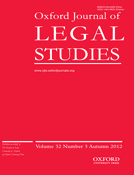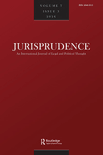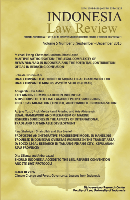
Doxa-Cuadernos de Filosofia y Derecho
Scope & Guideline
Cultivating Scholarly Exchange in the Heart of Alicante
Introduction
Aims and Scopes
- Philosophical Foundations of Law:
The journal focuses on the philosophical underpinnings of legal theories, exploring concepts such as legal positivism, interpretivism, and the nature of legal norms. - Legal Argumentation and Reasoning:
A significant emphasis is placed on the study of legal argumentation, including the role of reasoning in judicial processes and the importance of argumentative structures in legal contexts. - Ethical Dimensions of Law:
Contributions often address the ethical implications of legal decisions and frameworks, examining issues such as human rights, justice, and moral autonomy. - Historical and Comparative Analyses:
The journal also delves into historical perspectives on law and comparative studies that analyze different legal systems and philosophies across cultures. - Interdisciplinary Approaches:
Doxa encourages interdisciplinary research that intersects law with other fields such as political theory, sociology, and digital ethics, reflecting on contemporary challenges in legal philosophy.
Trending and Emerging
- Digital Ethics and Law:
There is a notable increase in discussions surrounding the implications of digital technologies on legal frameworks, including topics like data protection and the impact of artificial intelligence on legal processes. - Critical Legal Theory:
Recent papers reflect a growing interest in critical legal theory, exploring the intersections of law with social justice, power dynamics, and the role of emotions in legal decision-making. - Interdisciplinary Legal Studies:
The integration of insights from various disciplines, such as sociology and epistemology, is becoming more prominent, indicating a trend towards a broader understanding of law in societal contexts. - Historical Injustices and Compensatory Justice:
The journal has increasingly addressed themes related to historical injustices, emphasizing the need for compensatory justice and the role of law in rectifying past wrongs. - Philosophy of Law as Argumentation:
The exploration of law as a form of argumentation is emerging as a key theme, highlighting the importance of discourse, reasoning, and argumentative strategies in legal practice.
Declining or Waning
- Traditional Legal Formalism:
There appears to be a decreasing emphasis on traditional legal formalism as the journal shifts towards more dynamic and critical perspectives on law, focusing on argumentation and practical reasoning instead. - Static Views on Legal Principles:
The discourse surrounding static interpretations of legal principles is less prevalent, indicating a movement towards more fluid and contextual interpretations that accommodate evolving societal values. - Conventional Theories of Justice:
Conventional theories of justice, while still relevant, are receiving less attention in favor of discussions that integrate contemporary ethical dilemmas and socio-political contexts.
Similar Journals

Anuario de Filosofia del Derecho
Fostering Insightful Discourse in Legal PhilosophyAnuario de Filosofia del Derecho is a prestigious journal dedicated to the exploration and advancement of legal philosophy, published by the Ministerio Justicia, Centro Publicaciones in Madrid, Spain. With its ISSN 0518-0872, this journal serves as a critical platform for scholars, practitioners, and students interested in the intricate relationship between law and philosophy. The journal prioritizes original research articles, review papers, and thought-provoking essays that delve into contemporary issues and foundational theories within legal frameworks. Although currently not an open-access publication, it plays a vital role in stimulating discourse in legal and philosophical studies, guiding readers through complex theoretical landscapes while fostering a deeper understanding of justice and legal systems. By contributing to the discourse on legal thought, Anuario de Filosofia del Derecho stands out as an essential resource for anyone seeking to advance their knowledge in this field.

Revista do Curso de Direito do UNIFOR
Innovating legal thought for a changing world.Revista do Curso de Direito do UNIFOR, with ISSN 2236-7632, is a distinguished academic journal published by FUNDACAO EDUCACIONAL COMUNITARIA FORMIGUENSE in Brazil. Specializing in the field of legal studies, this journal aims to disseminate high-quality research that contributes to the understanding and development of legal theory and practice. Although the journal is currently not Open Access, it serves as a valuable platform for scholars and practitioners to share insights and advancements in law, fostering a robust dialogue among legal professionals, academics, and students. By maintaining rigorous academic standards, Revista do Curso de Direito do UNIFOR plays a crucial role in shaping legal discourse and encouraging interdisciplinary collaboration within the broader context of legal education. Researchers and students alike are encouraged to submit their work to advance the academic community's knowledge and engagement in contemporary legal issues.

Prolegomenos-Derechos y Valores
Exploring the intersection of rights and values.Prolegomenos-Derechos y Valores, published by UNIV MILITAR NUEVA GRANADA, is a distinguished peer-reviewed journal that has been an essential platform for scholarly discourse in the fields of law and ethics since its inception. With an ISSN of 0121-182X and E-ISSN of 1909-7727, this journal adopts an open-access model, allowing researchers, professionals, and students unrestricted access to its rich repository of knowledge since 2004. The journal is committed to fostering critical dialogue on contemporary legal issues, human rights, and moral values, thus playing a vital role in shaping the jurisprudential landscape in Latin America and beyond. Based in Bogotá, Colombia, it serves as a bridge for international collaborations and showcases research that contributes to understanding the ethical underpinnings of legal frameworks. By prioritizing high-quality scholarship and facilitating access to innovative ideas, Prolegomenos-Derechos y Valores aims to be a cornerstone resource for those engaged in the pursuit of legal knowledge and reform.

Revista de Estudos Constitucionais Hermeneutica e Teoria do Direito-RECHTD
Bridging Gaps in Constitutional UnderstandingRevista de Estudos Constitucionais Hermeneutica e Teoria do Direito-RECHTD is a distinguished academic journal published by UNIV VALE DORIO SINOS (UNISINOS), focusing on the realms of constitutional studies, hermeneutics, and legal theory. Since its inception as an Open Access publication in 2009, it has provided a platform for rigorous scholarly discourse and innovative research in the legal field, particularly within the Brazilian context. With its E-ISSN 2175-2168, this journal aims to foster a deeper understanding of the constitutional framework and its implications in contemporary society. Despite its recent Q4 ranking in the Law category, RECHTD offers valuable insights and developments, making it a crucial resource for researchers, professionals, and students interested in legal studies, especially those investigating the nuances of hermeneutics and theory of law. Its impact on the academic community is set to grow as it continues to bridge gaps in legal scholarship and promote informed dialogue.

Oxford Journal of Legal Studies
Elevating Understanding of Complex Legal FrameworksThe Oxford Journal of Legal Studies, published by Oxford University Press, stands as a prestigious platform for scholarly discourse within the field of law. Renowned for its impactful contributions to legal scholarship since its inception in 1981, this journal has established itself in the top tier of its category, currently classified as Q1 in Law based on the 2023 category quartiles. With its ISSN 0143-6503 and E-ISSN 1464-3820, the journal provides a comprehensive exploration of contemporary legal issues, theoretical perspectives, and empirical research, attracting contributions from leading academics and practitioners alike. Residing within the Social Sciences arena, it holds an impressive rank of 194/1025, landing it in the 81st percentile according to Scopus rankings. Though not currently an open-access publication, the Oxford Journal of Legal Studies remains vital for researchers, professionals, and students eager to deepen their understanding of legal frameworks and contemporary challenges within the legal landscape. Located in the heart of the United Kingdom, at Great Clarendon St, Oxford OX2 6DP, England, the journal is an indispensable resource for those advancing the study and practice of law.

Grotiana
Advancing Knowledge in Historical JurisprudenceGrotiana, a prestigious journal published by BRILL, stands as a vital resource for scholars and professionals engaged in the fields of History and Law. With its ISSN 0167-3831 and E-ISSN 1876-0759, this journal has been a beacon of academic inquiry since its inception, covering a diverse array of topics with an emphasis on legal history and historical jurisprudence. Grotiana holds a commendable impact within the academic community, reflected in its 2023 Scopus ranks indicating a 91st percentile in History and a 67th percentile in Law, underscoring its significance in interdisciplinary studies. Although not an open-access journal, it offers robust access options for institutions and individuals alike, facilitating research and knowledge dissemination. Scholars can benefit from its rich historical insights and rigorous legal analysis, contributing to the ongoing dialogue in these fields. With publishing cycles spanning from 1980 to 2024, Grotiana continues to uphold its commitment to excellence, making it a pivotal player for researchers, students, and professionals pursuing a deeper understanding of historical and legal frameworks.

Jurisprudence-An International Journal of Legal and Political Thought
Empowering Scholars to Transform Legal DiscourseJurisprudence: An International Journal of Legal and Political Thought, published by ROUTLEDGE JOURNALS, TAYLOR & FRANCIS LTD, serves as a vital platform for scholars and practitioners engaged in the ever-evolving discourse of legal and political theory. With its ISSN 2040-3313 and E-ISSN 2040-3321, this esteemed journal spans a converged period from 2015 to 2024, and has established itself in the Q2 quartile of the law category, ranking #359 out of 1025 and placing in the 65th percentile as per Scopus metrics in 2023. Based in the United Kingdom, this journal is dedicated to exploring the intricate relationships between law, political ideologies, and contemporary societal issues, thereby fostering interdisciplinary dialogue that is crucial for navigating today’s complex legal landscapes. Although it does not currently provide an open access option, Jurisprudence continues to attract a broad readership of researchers, professionals, and students seeking rigorous scholarship and practical insights into legal and political thought. With its strong impact within the field, the journal plays a significant role in shaping future discussions and advancements in legal studies.

Istanbul Hukuk Mecmuasi
Championing accessibility in legal discourse since 2017.Istanbul Hukuk Mecmuasi, published by ISTANBUL UNIV, FAC LAW, is a leading open-access journal dedicated to advancing the field of law since its establishment. With the ISSN 2636-7734 and E-ISSN 2667-6974, this journal serves as a pivotal platform for legal scholars, practitioners, and students to disseminate and access high-quality research and discussions on various aspects of law, including constitutional, private, and international law. Emphasizing accessibility, it has been providing open access to its publications since 2017, thereby promoting broader engagement and collaboration within the legal community. The journal aims to foster scholarly discourse and serves as an invaluable resource for those seeking to deepen their understanding of contemporary legal challenges in both a national and international context. With its commitment to high academic standards, Istanbul Hukuk Mecmuasi is the go-to journal for research that influences legal theory and practice.

Indonesia Law Review
Empowering Legal Minds Through Open Access ResearchIndonesia Law Review is a premier open-access academic journal dedicated to advancing knowledge in the fields of law and social sciences, with particular emphasis on the Indonesian legal landscape. Established by the Indonesian Law Review, this journal has made significant strides since becoming open access in 2014, ensuring that research is freely available to a global audience. Based in Depok, West Java, the journal seeks to foster scholarly discourse on legal issues pertinent to Indonesia, while also contributing to the broader field of education and social sciences. With its current Scopus rankings placing it within the top tiers of law and social sciences, including a Q3 categorization in law and a Q4 classification in education and miscellaneous social sciences, the **Indonesia Law Review** serves as a vital platform for researchers, professionals, and students to disseminate their findings and engage with contemporary legal dilemmas. The journal is committed to providing a robust forum for innovative legal scholarship and is an essential resource for anyone seeking to understand the complexities of law in Indonesia and beyond.

SYDNEY LAW REVIEW
Empowering Scholars and Practitioners in LawSYDNEY LAW REVIEW is a prestigious academic journal published by the Sydney Law School, dedicated to the field of legal studies and interdisciplinary analysis of law and its impact on society. With its ISSN 0082-0512 and E-ISSN 1444-9528, this journal serves as a vital resource for legal scholars, researchers, and practitioners in Australia and globally. The journal has undergone several phases since its inception in 1990, reflecting the evolving landscape of legal scholarship and policy. Although currently not an open-access publication, it remains a significant contributor to legal discourse, maintaining a Q4 ranking in the Law category as per the 2023 category quartiles. The SYDNEY LAW REVIEW encourages submissions that critically explore contemporary legal issues, thereby fostering a robust platform for academic inquiry and professional advancement.